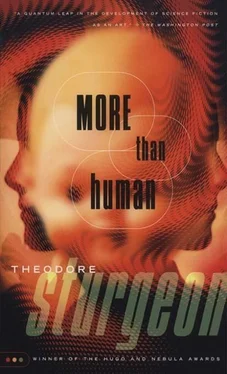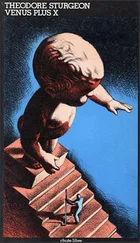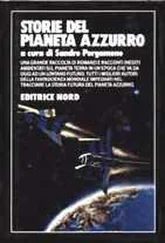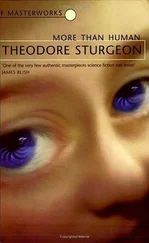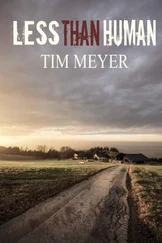Theodore Sturgeon - More Than Human
Здесь есть возможность читать онлайн «Theodore Sturgeon - More Than Human» весь текст электронной книги совершенно бесплатно (целиком полную версию без сокращений). В некоторых случаях можно слушать аудио, скачать через торрент в формате fb2 и присутствует краткое содержание. Год выпуска: 1953, Жанр: Фантастика и фэнтези, на английском языке. Описание произведения, (предисловие) а так же отзывы посетителей доступны на портале библиотеки ЛибКат.
- Название:More Than Human
- Автор:
- Жанр:
- Год:1953
- ISBN:нет данных
- Рейтинг книги:5 / 5. Голосов: 1
-
Избранное:Добавить в избранное
- Отзывы:
-
Ваша оценка:
- 100
- 1
- 2
- 3
- 4
- 5
More Than Human: краткое содержание, описание и аннотация
Предлагаем к чтению аннотацию, описание, краткое содержание или предисловие (зависит от того, что написал сам автор книги «More Than Human»). Если вы не нашли необходимую информацию о книге — напишите в комментариях, мы постараемся отыскать её.
More Than Human — читать онлайн бесплатно полную книгу (весь текст) целиком
Ниже представлен текст книги, разбитый по страницам. Система сохранения места последней прочитанной страницы, позволяет с удобством читать онлайн бесплатно книгу «More Than Human», без необходимости каждый раз заново искать на чём Вы остановились. Поставьте закладку, и сможете в любой момент перейти на страницу, на которой закончили чтение.
Интервал:
Закладка:
At last he finished his detector. It involved a mercury switch and a solenoid and a variable power supply and would detect the very slightest changes in the field of its own magnet. It weighed about forty pounds but this mattered not at all since he did not intend to carry it. He got the best ordnance maps of the area that he could find, appointed as a volunteer the stupidest-looking Pfc he could find, and spent a long day of his furlough time out on the range, carefully zigzagging the slope and checking the readings off on his map until he located the centre of the degaussing effect.
It was in a field on an old abandoned farm. In the middle of the field was an ancient truck in the last stages of oxidation. Drought and drift, rain and thaw had all but buried the machine and the Lieutenant flogged himself and his patient soldier into a frenzy of explosive excavation. After sweaty hours, they had dug and scraped and brushed until what was left of the truck stood free and clear; and under it they found the source of the incredible field.
From each corner of the frame ran a gleaming silvery cable. They came together at the steering column and joined and thence a single cable ran upward to a small box. From the box protruded a lever. There was no apparent power source but the thing was operating.
When Barrows pushed the lever forward, the twisted wreck groaned and sank noticeably into the soft ground. When he pulled the lever back, it crackled and creaked and lifted up to the limits of its broken springs and wanted to lift even more.
He returned the lever to neutral and stepped back.
This was everything he had hoped to find certainly and made practical the wildest of his dreams. It was the degaussing generator, awaiting only his dissection and analysis. But it was all these things as a by-product.
Lever forward, this device made the truck heavier. Lever back, lighter.
It was anti-gravity!
Anti-gravity: a fantasy, a dream. Anti-gravity, which would change the face of the earth in ways which would make the effects of steam, electricity, even nuclear power, mere sproutings of technology in the orchard this device would grow. Here was skyward architecture no artist had yet dared to paint; here was wingless flight and escape to the planets, to the stars, perhaps. Here was a new era in transportation, logistics, even the dance, even medicine. And oh, the research… and it was all his.
The soldier, the dull-witted Pfc, stepped forward and yanked the lever full back. He smiled and threw himself at Barrows’ legs. Barrows kicked free, stood, sprang so his knees crackled. He stretched, reached, and the tips of his fingers touched the cool bright underside of one of the cables. The contact could not have lasted longer than a tenth of a second; but for years afterwards, for all the years Barrows was to live, part of him seemed to stay there in the frozen instant, his fingertips on a miracle, his body adrift and free of earth.
He fell.
Nightmare.
First the breast-bursting time of pounding heart and forgotten breathing, the madness of an ancient ruin rising out of its element, faster and faster, smaller and smaller into the darkening sky, a patch, a pot, a speck, a hint of light where the high sunlight touched it. And then a numbness and pain when the breath came again.
From somewhere the pressure of laughter; from somewhere else, a fury to hate it and force it down.
A time of mad shouting arguments, words slurred into screams, the widening crescents of laughing eyes, and a scuttling shape escaping him, chuckling. He did it… and he tripped me besides.
Kill…
And nothing to kill; racing into the growing dark and nothing there; pound-pound of feet and fire in the guts and flame in the mind. Falling, hammering the uncaring sod.
The lonely return to the empty, so empty, so very empty hole in the ground. Stand in it and yearn upward for the silver cables you will never see again.
A yellow-red eye staring. Bellow and kick; the detector rising too, but only so high, turning over and over, smashed, the eye blind.
The long way back to barracks, dragging an invisible man called Agony whose heavy hands were clamped upon a broken foot.
Fall down. Rest and rise. Splash through, wallow, rise and rest and then the camp.
HQ. Wooden steps, the door dark; hollow hammering; blood and mud and hammering. Footsteps, voices: astonishment, concern, annoyance, anger.
The white helmets and the brassards: MP. Tell them, bring the Colonel. No one else, only the Colonel.
Shut up, you’ll wake the Colonel.
Colonel, it’s anti-magnetron, to the satellite, and freight; no more jets!
Shut up, ROTC boy.
Fight them then and someone screamed when someone stepped on the broken foot.
The nightmare lifted and he was on a white cot in a white room with black bars on the windows and a big MP at the door.
‘Where am I?’
‘Hospital, prison ward, Lieutenant.’
‘God, what happened?’
‘Search me, Sir. Mostly you seemed to want to kill some GI. Kept telling everybody what he looks like.’
He put a forearm over his eyes. ‘The Pfc. Did you find him?’
‘Lieutenant, there ain’t such a man on the roster. Honest. Security’s been through every file we got. You better take it easy, Sir.’
A knock. The MP opened the door. Voices.
‘Lieutenant, Major Thompson wants to talk to you. How you feel?’
‘Lousy, Sergeant. Lousy… I’ll talk to him, if he wants.’
‘He’s quiet now, Sir.’
A new voice— that voice! Barrows pressed down on the forearm he held over his eyes until sparks shone. Don ’ t look; because if you ’ re right, you ’ ll kill him.
The door. Footsteps. ‘Evening, Lieutenant. Ever talk to a psychiatrist before?’
Slowly, in terror of the explosion he knew must come, Barrows lowered his arm and opened his eyes. The clean, well-cut jacket with a Major’s leaves and the Medical Corps insignia did not matter. The man’s professionally solicitous manner, the words he spoke—these meant nothing. The only thing in the universe was the fact that the last time he had seen this face, it belonged to a Pfc, who had uncomplainingly and disinterestedly hauled his heavy detector around for a whole, hot day; who had shared his discovery; and who had suddenly smiled at him, pulled the lever, let a wrecked truck and a lifetime dream fall away upward into the sky.
Barrows growled and leapt.
The nightmare closed down again.
They did everything they could to help him. They let him check the files himself and prove that there was no such Pfc. The ‘degaussing’ effect? No observations of it. Of course, the Lieutenant himself admitted that he had taken all pertinent records to his quarters. No, they are not in the quarters. Yes, there was a hole in the ground out there and they’d found what he called his ‘detector’, though it made no sense to anyone; it merely tested the field of its own magnet. As to Major Thompson, we have witnesses who can prove he was in the air on his way here when it happened. If the Lieutenant would only rid himself of the idea that Major Thompson is the missing Pfc, we’d get along much better; he isn’t, you know; he couldn’t be. But of course, Captain Bromfield might be better for you at that…
I know what I did, I know what I saw. I ’ ll find that device or whoever made it. And I ’ ll kill that Thompson!
Bromfield was a good man and heaven knows he tried. But the combination in the patient of high observational talent and years of observational training would not accept the denial of its own data. When the demands for proof had been exhausted and the hysterical period was passed and the melancholia and finally the guarded, superficial equilibrium was reached, they tried facing him with the Major. He charged and it took five men to protect the Major.
Читать дальшеИнтервал:
Закладка:
Похожие книги на «More Than Human»
Представляем Вашему вниманию похожие книги на «More Than Human» списком для выбора. Мы отобрали схожую по названию и смыслу литературу в надежде предоставить читателям больше вариантов отыскать новые, интересные, ещё непрочитанные произведения.
Обсуждение, отзывы о книге «More Than Human» и просто собственные мнения читателей. Оставьте ваши комментарии, напишите, что Вы думаете о произведении, его смысле или главных героях. Укажите что конкретно понравилось, а что нет, и почему Вы так считаете.
